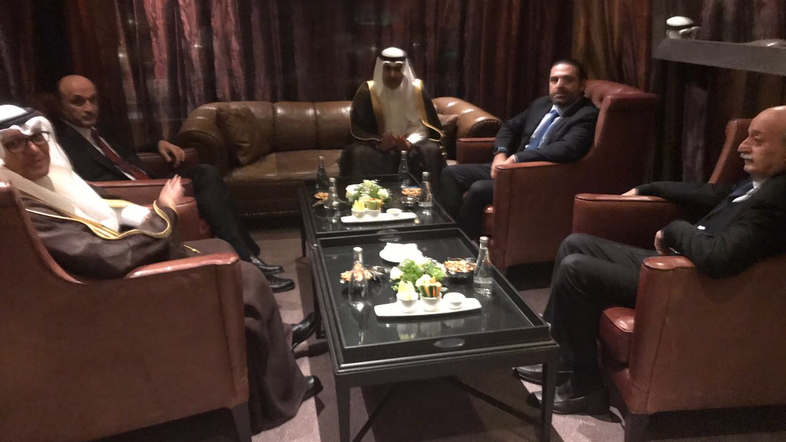
Staff writer, Al Arabiya — Saudi envoy Nizar Al Alula succeeded in holding a reconciliation meeting between Lebanese Prime Minister Saad al-Hariri, the executive chairman of the Lebanese Forces Party, Samir Geagea and Druze leader Walid Jumblatt. The meeting between the three leaders is the first of its kind in a long time. A source commented that the meeting was the beginning of understandings between the three parties, stressing that the Saudi move aims to strengthen the Lebanese national leaders to achieve stability in Lebanon. Al Alula confirmed to the Lebanese officials whom he met with last Monday in Beirut and Baabda that “Lebanon is at the heart of the Saudi leadership and its thoughts,” the newspaper Asharq al-Awsat reported. Al Alula gave Lebanese Prime Minister Saad al-Hariri an official invitation to visit the kingdom.

by Gulf news-– Sami Moubayed, Correspondent — Beirut: “This is a clear message that the Arabism of Lebanon overcomes all other loyalties.” These were the words of Prime Minister Sa’ad Hariri on Tuesday at an official ceremony naming a major street in the Lebanese capital after King Salman Ibn Abdul Aziz Al Saud At the event, Hariri issued a veiled message to Hezbollah without naming them directly: “Between Lebanon and Saudi Arabia there is an unbreakable history, no matter how hard they try.” Attending the event were Saudi Ambassador to Lebanon Walid Al Boukhari and a royal envoy from Riyadh, Nizar Al Aloula. Ziad Chebib, the governor of Beirut, spoke saying: “By naming a street on the Mediterranean, this is a message to the world that Beirut is committed to its Arab character, as it has been throughout its modern history.” There was no official statement from Hezbollah but the pro-Hezbollah daily Al Akhbar claimed that the ceremony was “insulting” to Lebanon whereas the Free Patriotic Movement (FPM) of President Michel Aoun, also allied to Hezbollah, re-ran an editorial from the same daily, entitled: “The streets of Beirut on public auction.” In response prominent Druze leader Walid Junblatt, responded via Twitter, saying that ceremony in Beirut reminds the world of Lebanon’s Arabism—as opposed to being a proxy for Iran.
Junblatt, a backer of former Egyptian President Jamal Abdul Nasser, the face of Arab nationalism, recalled how King Salman, then a young prince of 21, had volunteered to serve in the Egyptian Army during the Suez Canal War of 1956. The King Salman Ibn Abdul Aziz Street lies on the seaside, across from a posh neighbourhood called Minet Al Hosn on the famous Zeitouna Bay waterfront. Posh restaurants and hotels are scattered across the area, including the Four Seasons and the St. Georges. The new street intersects with Ahmad Shawki Street, named after the early 20th century Egyptian poet.
In 2005, the Beirut Municipality named a street after the late King Fahd Ibn Abdul Aziz, stretching from the western port to Downtown Beirut. Some names stick to the consciousness of the Beirutis, like that of Protestant Reverend Daniel Bliss, founder of the American University of Beirut (AUB) whose “Bliss Street” is a hallmark of the Lebanese capital. Others have not like “Paris Boulevard” which is universally known as “Al Manara.” Politicians in the pro-Syrian March 8 Coalition alliance, running against Hariri in the upcoming parliamentary elections, was part of a larger election campaign aiming win back support of Sunnis disaffected by Hariri’s policies. They argued that he was namely targeting Ashraf Rifi, a former minister and cabinet official who defected from the Hariri’s team and is now challenging him in Tripoli. Rifi, a one-time pillar of the anti-Syrian March 14 Coalition, was also visibly absent from the street naming ceremony. Earlier on Friday, Saudi Ambassador Boukhari and his UAE counterpart Hamad Al Shamis paid a visit to Baalbak in the Bekka Valley, where they were guests of its mufti, Khaled Salah. The two diplomats met with community leaders and Hussain Solh, the Hariri parliamentary candidate for Baalbak. Hezbollah is putting full weight behind the Baalbak elections, and saw the visit as trespassing on its geographic fiefdom, especially after they chose to visit the Umayyad Mosque of Baalbak and then visit its King Faisal Ibn Abdul Aziz Mosque. They responded days later with a military parade in the very same city.



